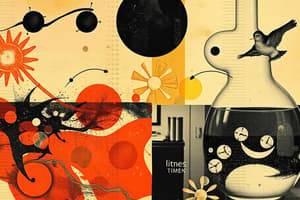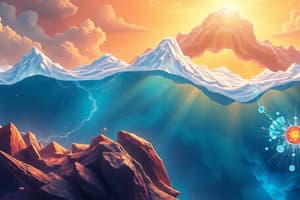Podcast
Questions and Answers
Which of the following is a physical property of matter?
Which of the following is a physical property of matter?
- Flammability
- Chemical stability
- Toxicity
- Mass (correct)
What is the temperature at which pure water freezes?
What is the temperature at which pure water freezes?
- 0°C (correct)
- 100°C
- 50°C
- -32°C
Which state of matter has a fixed shape and volume?
Which state of matter has a fixed shape and volume?
- Gas
- Plasma
- Liquid
- Solid (correct)
What describes the boiling point of pure water?
What describes the boiling point of pure water?
Which statement correctly differentiates boiling from evaporation?
Which statement correctly differentiates boiling from evaporation?
Which of the following correctly defines the melting point?
Which of the following correctly defines the melting point?
What physical characteristic does NOT describe gases?
What physical characteristic does NOT describe gases?
Which of the following properties is NOT a chemical property of matter?
Which of the following properties is NOT a chemical property of matter?
What is the chemical composition of a water molecule?
What is the chemical composition of a water molecule?
Which form of water is the most abundant on Earth?
Which form of water is the most abundant on Earth?
Why is water referred to as an 'universal solvent'?
Why is water referred to as an 'universal solvent'?
Which phase transitions can occur in the water cycle?
Which phase transitions can occur in the water cycle?
What role does the sun play in the water cycle?
What role does the sun play in the water cycle?
How much of an infant's body is made up of water?
How much of an infant's body is made up of water?
Which categories is matter divided into?
Which categories is matter divided into?
What is one of the uses of water in everyday life?
What is one of the uses of water in everyday life?
Flashcards
What is Chemistry about?
What is Chemistry about?
The study of the properties, composition, structure, and transformations of substances (elements and compounds), along with the energy changes involved.
What are physical properties?
What are physical properties?
These are characteristics that can be observed or measured without changing the substance's chemical composition.
What are chemical properties?
What are chemical properties?
These describe how a substance reacts with other substances or changes its chemical composition.
What are the states of matter?
What are the states of matter?
Signup and view all the flashcards
What is melting point?
What is melting point?
Signup and view all the flashcards
What is freezing point?
What is freezing point?
Signup and view all the flashcards
What is boiling point?
What is boiling point?
Signup and view all the flashcards
What are the differences between boiling and evaporation?
What are the differences between boiling and evaporation?
Signup and view all the flashcards
What is the water cycle?
What is the water cycle?
Signup and view all the flashcards
Why is water called the 'universal solvent'?
Why is water called the 'universal solvent'?
Signup and view all the flashcards
Why is water essential for all life?
Why is water essential for all life?
Signup and view all the flashcards
What is the structure of a water molecule?
What is the structure of a water molecule?
Signup and view all the flashcards
What is the most abundant water form on Earth?
What is the most abundant water form on Earth?
Signup and view all the flashcards
What is the role of the sun in the water cycle?
What is the role of the sun in the water cycle?
Signup and view all the flashcards
How do we categorize matter?
How do we categorize matter?
Signup and view all the flashcards
What is water vapor?
What is water vapor?
Signup and view all the flashcards
Study Notes
Chemistry Context - Grade 7
- Chemistry is the science of substances' properties, composition, and structure, including transformations and energy changes.
- Physical properties of matter include length, color, density, mass, elasticity, pressure, and volume.
- Chemical properties of matter include toxicity, oxidation, heat of combustion, stability, flammability, coordination number, and reactivity, along with chemical bonds and enthalpy of formation.
- States of matter are solids, liquids, gases, and plasma.
- Solids have rigid structure with fixed shape and volume; molecules vibrate within limited space.
- Liquids have a fixed volume but take the shape of their container; molecules flow.
- Gases have no fixed shape or volume; molecules move freely.
- Plasma is a high-temperature state where atoms lose electrons, forming a mix of electrons and nuclei.
Changes of State
- Matter changes state through various processes:
- Melting (solid to liquid)
- Freezing (liquid to solid)
- Evaporation (liquid to gas)
- Condensation (gas to liquid)
- Deposition (gas to solid)
- Sublimation (solid to gas)
Melting and Freezing Points
- Melting point is the temperature where a substance changes from solid to liquid.
- Freezing point is the temperature where a substance changes from liquid to solid.
- Pure water's melting and freezing point is 0°C.
Boiling Point
- Boiling point is the temperature where a liquid changes to a gas (vapor).
- Pure water's boiling point is 100°C.
Water Properties
- Water is essential for life, covering 70% of Earth's surface.
- It's a major component of living organisms (up to 95%).
- The chemical symbol for water is H₂O.
- A water molecule consists of two hydrogen atoms and one oxygen atom.
- Water is a universal solvent, dissolving many substances.
- Most abundant form of water on Earth is saltwater.
- The water cycle involves continuous movement of water on, above, and below Earth's surface.
Mixtures
- Mixtures result from combining two or more substances.
- Mixtures can be homogeneous (uniform composition; components not easily identified) or heterogeneous (non-uniform; components distinct).
- Solutions are homogeneous mixtures.
- Solutions are made of a solvent (usually more abundant) and a solute (dissolved substance).
- Components of mixtures can be present in various proportions.
Studying That Suits You
Use AI to generate personalized quizzes and flashcards to suit your learning preferences.




